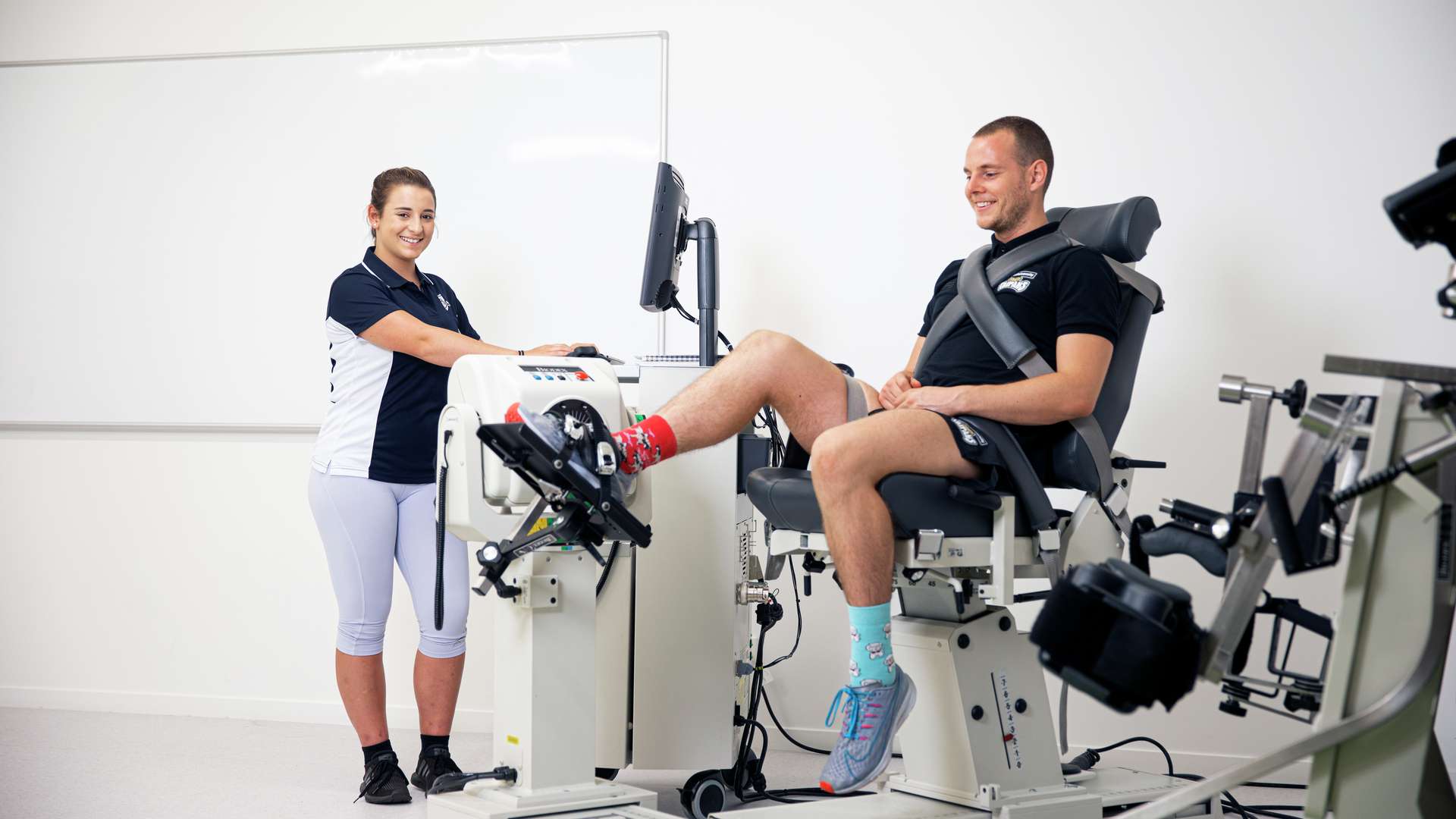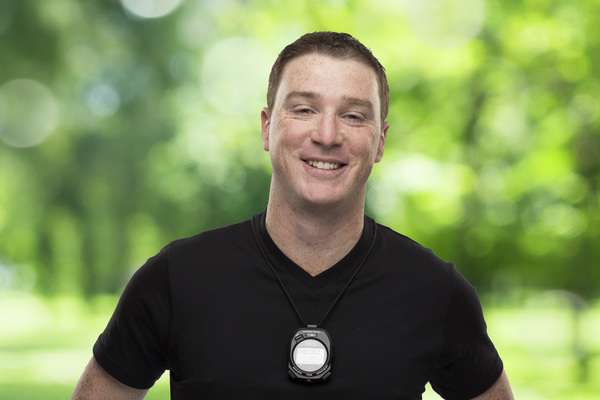Bachelor of Exercise and Sport Sciences

Overview
Study the Bachelor of Exercise and Sport Sciences and discover the diverse world of human movement – a field that applies to human fitness, elite performance, family and community health, lifestyle management, occupational health and safety and personal health.
The Bachelor of Exercise and Sport Sciences will equip you with practical skills in the various disciplines relevant to exercise and sport sciences such as anatomy and physiology, nutrition, exercise physiology, biomechanics, health and sport psychology, motor control and learning, and exercise prescription and delivery.
You will gain a comprehensive understanding of the processes and mechanisms of the human body as they relate to exercise and sport science and have the flexibility to pursue an area of interest, and can choose a minor in biomedical sciences, management and business or secondary teaching. Benefit from small class sizes and a personalised learning experience that caters to your individual needs, enabling you to graduate work-ready and with skills highly desired by employers. Your studies will include a mix of theory and hands-on laboratory experiences so you can apply what you have learnt directly into practice.
The Bachelor of Exercise and Sport Sciences includes work-integrated learning placements giving you exposure to real workplace environments. During these placements, you will apply skills learned throughout the course and gain practical experience conducting exercise assessment, prescription, and delivery for a range of populations. You may choose to study by online study while working in the industry, allowing you to earn and gain practical experience while you learn.
Study Experience
- Real-World Learning Facilities
- Work-Integrated Learning
- Authentic Learning Experiences
- Accredited Qualification
 “
“Sport science appealed to me because it's more analytical and research-based and has a firm grounding in science. It combined my love of sports with a research and knowledge base.
Liam Bromilow
Bachelor of Exercise and Sport Science
Career Opportunities
Completing the Bachelor of Exercise and Sport Sciences is your gateway into many diverse professions in Australia and overseas. Employment opportunities exist in areas such as:
- regional and state sporting organisations
- corporate health and fitness
- government agencies associated with exercise, sport, physical activity and health
- sports institutes and academies
- professional sports training, coaching and development, strength and conditioning
- rehabilitation clinics and hospitals
- private business in personal training and rehabilitation
- universities and colleges with involvement in education and research.
Postgraduate pathways
This exercise science course is an ideal pathway to further study in areas such as exercise and sports science, physiotherapy and nutrition. It can also provide a pathway to further study towards courses such as a Master of Clinical Exercise Physiology (in development at CQU) to become an accredited Exercise Physiologist.
If you are interested in teaching physical education at secondary schools after completing this course, you may like to apply for CQU's Master of Teaching (Secondary).
Structure & Availability
The course structure and available locations can change depending on when you want to study. You can choose the intake that best suits you in the drop-down menu below.
Available Locations
Your Course
You must complete 24 units (144 credits):
- 1The core structure (18 units)
- 2One six-unit minor
Unit Details
The units you'll study are listed below. Click on a unit to learn more.
Course Planner
To help you plan your studies and see which unit comes first, if one unit should be completed before another and when you will study each unit, check out our course planners.
Additional Information
Professional Practice - Exercise & Sports Science Australia (ESSA)
Core
The Bachelor of Exercise and Sport Sciences is accredited by Exercise and Sports Science Australia (ESSA). Graduates from the Bachelor of Exercise and Sport Sciences course between 2014 and 2024 (inclusive) can gain professional recognition as an Accredited Exercise Scientist.
Note: When applying for accreditation through ESSA, Academic transcripts prior to 2020 must state ESSA accredited stream or be accompanied by a letter to confirm ESSA accredited minor was completed.
Advanced Exercise Prescription and Delivery - ESSC13008
Students must complete a compulsory practicum experience with healthy populations under the supervision of a health professional. Placement hours will consist of a range of activities relevant to exercise and sport sciences and include exercise assessment, prescription, and delivery.
Professional Practice in Exercise and Sports Science - ESSC13009
Students must complete a compulsory practicum experience with healthy populations under the supervision of a health professional. Placement hours will consist of a range of activities relevant to exercise and sport sciences and include exercise assessment, prescription, and delivery.
Advanced Clinical Exercise Science - ESSC13005
Students must complete an observational placement in a clinical setting where exercise is used in the assessment, treatment, or prevention of chronic or complex health conditions.
Across the three-year course, students will complete up to 150 hours of work-integrated learning through voluntary experience and observation in professional practice placements, working with the general population, athletic populations, and clinical populations.
Additional practical experience is provided through laboratory activities and research projects conducted throughout the course units.
If you have completed prior study relevant to units within this course, you may be eligible for credit for your past studies. Learn more about credit and recognition of prior learning.
Requirements
To Be Eligible
For your application to be considered, you must meet the following entry requirements.
Student and Course Profiles
View the student and course profiles for this course and learn about CQU's Undergraduate Profile for Term 1, 2024 via our Institute Profile.
During Your Study
While not needed to apply, you'll need to meet the following requirements throughout your studies.
Fees & Scholarships
Indicative First-Year Fee
The Indicative First-Year Fee is the approximate cost of enrolling in this course for one full-time academic year (eight units over two terms) for a Commonwealth Supported Place (CSP) and should be used as a guide only. Your actual fees may vary, depending on the units you select to study and your study load. Check the cost-per-unit spreadsheet available on our fees webpage for the approved unit fees. Fees are reviewed each year and are subject to change. Understanding your fees.
Commonwealth Supported Places
This course has Commonwealth Supported Places (CSPs) available, and as a domestic student, you'll be offered a CSP, provided you meet CSP eligibility requirements. CSPs are subsidised by the Australian Government, meaning you are only required to pay the student contribution rather than full tuition fees.
HECS-HELP Loan
You may be eligible for a HECS-HELP government loan if you are offered a CSP. HECS-HELP is an Australian Government loan scheme that assists you in paying your student contributions. Provided you meet the HECS-HELP eligibility criteria, you may use HECS-HELP to defer part or all of your student contribution fees.
Part of your course costs will include Student Services and Amenities Fees (SSAF). SSAF is charged in addition to your student contribution or tuition fees and is used to help enhance your study experience. There may also be other costs as part of your studies, such as textbooks, technology expenses, travel expenses, professional certifications, uniforms, or vaccinations. Explore other study costs.
We believe a quality education can be for everyone – regardless of background, location, or life circumstances. That's why we offer a variety of scholarships and bursaries that can give you a helping hand with a range of expenses and enhance your employability.
How to Apply
How to Apply
Check what you need to do to apply to study this course.
Your Application Options
Follow These Steps
Extra Admission Information
Prior to applying, take a look at important application dates and learn about our admission considerations, such as information for domestic students with overseas qualifications, indigenous support, and elite athlete, coach and performer support. You should also check out the adjustment schemes that might be available to you and how to access them. You can also explore our offer information to learn more about what happens after you've submitted an application and how to respond to an offer to study with CQU.
Applying for 2026
Applications for 2026 via the Universities Admissions Centre (UAC) open in April 2025.
More information will be available soon.
